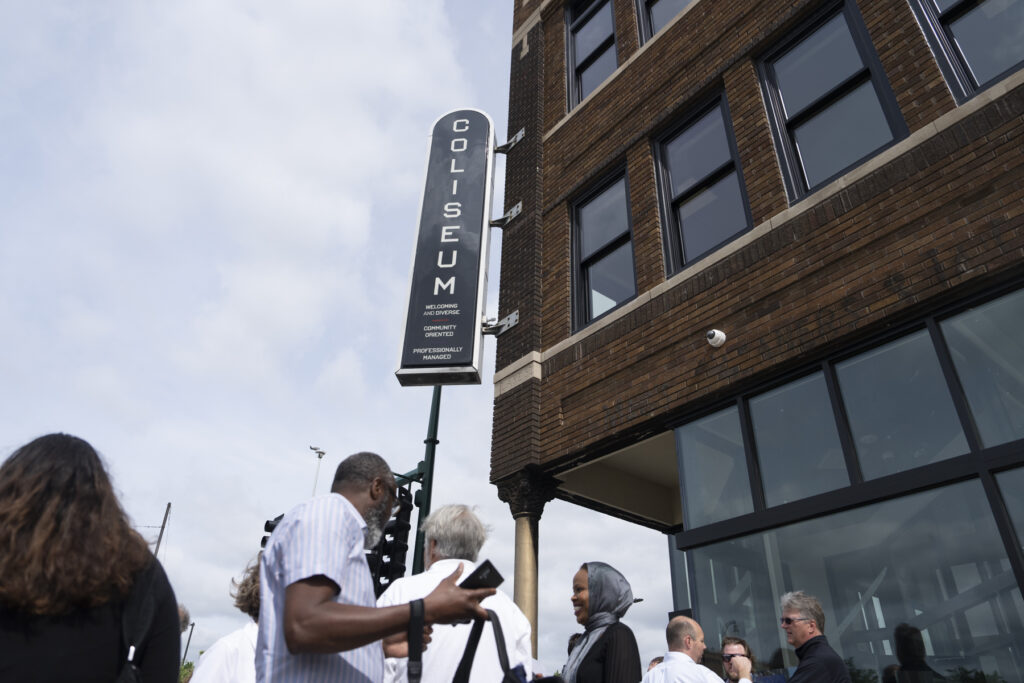A historic building in south Minneapolis that was set on fire during unrest following the death of George Floyd has reopened after a $30 million renovation.
The redeveloped coliseum as a Black-owned business incubator will be home to the relocated Du Nord Social Spirits, as well as New Orleans-style restaurant Lagniap, which is scheduled to open in late summer or early fall, and several other small businesses.
Du Nord owners Chanel and Chris Montana purchased the Coliseum building with architect Alicia Belton, business consultant Janice Downing and community development firm Redesign.
The building, two blocks from the city's former 3rd Precinct Police Station, was heavily damaged by fire and water discharge from the building's sprinklers during the 2020 unrest following the killing of George Floyd and has been vacant for more than three years.
“This is more than just a building. This is part of a larger reckoning with racism in our community, a cry for justice, and this building is part of that story,” Redesign Executive Director Andy Hestness said at Wednesday's ribbon-cutting ceremony.
The ribbon cutting took place in conjunction with the Soul of the Southside Juneteenth Festival.
Belton said people have been pleasantly surprised by the restoration work since the Coliseum building reopened for tours last month during the city's Doors Open event, which has seen the building filled with artwork and also features community meeting and workspace.
“As part of healing the neighborhood, this is a place where people can live,” she said, “a place where people want to come for coffee and meet their neighbors.”
Chanel Montana said she and her husband, Chris, have lived in New Orleans for the past four years and wanted to bring some of that experience back to their home state of Minnesota.
“[New Orleans] “It's this warmth and this spicy, colorful nature that's brought it into our lives, and we want to bring a little bit of that here to Minneapolis and Lake Street,” she said.
Du Nord, the nation's first Black-owned distillery, closed its south Minneapolis cocktail room in 2020 due to the pandemic. The cocktail room remained closed after it was damaged during the Floyd protests.
Montana said the couple hopes to reopen Du Nord and Lagnap in August or September. The goal, she said, is to create a semi-formal space that will serve more traditional evening fare such as po'boys and a bar featuring spirits from around the country.
“I look forward to having someone come through the door on a cold winter’s night. [or] “It's fun enjoying crisp fall evenings and waves of color and spice,” Montana said.

Taylor Smrikarova, real estate development director and project manager for Redesign, said the restoration is just the beginning and an example of the equitable development the community deserves in the wake of the killing of George Floyd.
Minneapolis Mayor Jacob Frey said at the dedication ceremony Wednesday that the coliseum will enable Black businesses to own property along with their businesses and build generational wealth.
“This is a right that has been largely denied to the Black community for generations,” Frey said, “and here on East Lake Street, we intend to make sure that changes happen.”
City Councilman Robin Wansley said the project, spearheaded by Black business owners, will help neighbors see the redevelopment of their neighborhood with a focus on equity and justice.
“I want to thank all of our co-owners for being a beacon of hope during this time of uncertainty about what we should do in our community,” she said.
Funding for the project included a city loan, as well as historic tax credits, state and private funding and federal energy funds.
The building was the center of a bustling business district when the three-story Freeman's department store opened in 1917. Over the next few decades, the building was renovated several times and housed a Denny's restaurant and a medical clinic, but was damaged and boarded up in 2020.
Belton, the owner-tenant, said she and Dowling had been considering buying the building for years and were encouraged to move forward with the project by Smrikarova, who was then a client of Belton's. Its size, the neighborhood's history and access to nearby light rail and bus lines were appealing, she said.
“It was a little bigger than I expected, but then you walk through the space and you think, 'Yep, this looks great,'” Belton said.
Downing owns CommonSense Consulting@Work, and Belton owns the architecture firm Urban Design Perspectives. Both men said they hope to continue expanding their practices and working in the surrounding area.

As part of the restoration, some of the building's history was preserved, including a wall on the second floor that serves as a reminder of fire damage that occurred during the 2020 George Floyd protests.
Redesign's Hestnes said that during the fire, heat and smoke circulated through the building, and when the sprinklers were activated, the smoke mixed with the water, creating droplet patterns along the second-floor walls.
“We wanted to preserve it and remember that time, those protests and George Floyd,” he said.
Another aspect that was preserved is the remains of a staircase leading down through the basement wall, telling the story of a Lake Street entrepreneur who had his own private basement and commercial centre in the neighbourhood.
While the building's history will remain intact, there will be 30 spaces reserved for tenants, with plenty of room to grow: Downing hopes to have at least 25 percent of the building occupied by the end of this year and reach 85 to 95 percent occupancy by year four.
“I really want to work and smile and see people like me using this building,” Downing said.


Source: Google Street View (left), courtesy of Collin Hausman via Google Street View (right)

